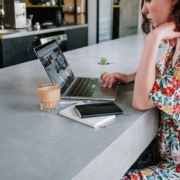How Beauty Retail Will Change As Stores Reopen
‘How much of consumers’ new online beauty shopping habits will stick when stores reopen? How should beauty retailers react?’ BARE shares an article by Richard Kestenbaum for Forbes with new trends and innovations in the beauty retail industry.
‘Stirling Murray, Founder & CEO of The Red Tree, a highly successful beauty advisory business in the U.K., said, “the beauty business is very resilient. It’s always the first industry to come out of a recession. It will come back to where it was before but the methods of doing business will be very different.” One of the most important differences he’s referring to is how physical store retailers will have to compete against newly-strengthened online beauty merchants.
Multibrand physical beauty stores like Sephora and Ulta have been stronger competitors than other kinds of retailers because consumers are motivated to go for the fun of finding and trying new products, even meeting up with friends and making social events out of it. But during the pandemic, consumers adopted to online shopping. Divya Gugnani, Co-Founder of Wander Beauty, told me, “this is a test of leadership under fire…[before the shutdown] people were heavily exposed to stores.”
Online Isn’t Just Click-To-Buy Anymore
Credo Beauty, a nine-store beauty retailer focused on selling the highest standard of clean beauty products (no harmful chemicals), repurposed its business when the shutdown closed all its stores. Instead of furloughing sales associates, it retrained them to sell to consumers on its online corporate chat system. Credo created virtual appointments for consumers to make “clean swaps” where “you dump out your makeup bag and we show you new stuff [that’s clean and better for you].” It’s a new selling tool that combines the skill of knowledgeable, personable store associates with the convenience of online. With stores now reopening, combining appointments online with in-store one-on-one appointments will expand personalization and in-store hygiene, creating a major shift for how beauty retailers operate. No one knows if this will be a net plus or a minus for retailers; the individualized appointments increase basket size but reduce spontaneity and impulse purchasing.
Credo is not alone. The first thing a user sees on the landing page of Peach & Lily, an online retailer of Korean beauty products, is the message, “Get customized, 1-on-1, skincare routines. video or chat, up to you! From our skincare experts.”
A retail store named Showfields consists entirely of brands and designers, previously only online, that are displaying their brands and products in a physical store for the first time. A number of Showfields’ brands are beauty businesses and while the store was shut during the pandemic, Showfields initiated shoppable livestreaming, video shows that explain the uses and benefits of products and during which a user can click to buy. Tomorrow, Showfields is hosting Morgan Brown, a beauty influencer, who will explain why she’s chosen these products to showcase on their livestream. Consumers click right on the show to buy the products being displayed.
Shoppable livestreaming sounds simple but it is an innovative, different and convenient way for online and mobile shoppers to learn about new products and buy and it is a huge trend in China. It’s important for beauty consumers because it provides explanation, demonstration and convenience, critical to beauty shopping. Showfields also has click-to-video where a user looking at a product can create an instant video chat with an associate who is in the actual store, sees what the user has been looking at, can chat with them about it and demonstrate it.
Community
The social aspect of shopping with friends can’t be duplicated online as in a store. But there are other ways for consumers to experience camaraderie and gain the confidence about a purchase that comes from friends’ reactions. Peach & Lily’s Instagram live events has created an online community where consumers can react to each other in real time and generates very high consumer engagement. Building community online also enables beauty retailers to maintain a competitive edge against Amazon AMZN.
Technology
Technology will become more important for beauty retailing as stores reopen. Sarah Willersdorf, global head of luxury at Boston Consulting Group, says augmented reality, like virtual try-on will grow both in-store and online. Being able to visualize skin texture and shading virtually will help product selection while maintaining safety and hygiene for the rapidly growing skincare segment.
Findng new products is a key reason why consumers go into beauty stores like Sephora and Ulta. Now artificial intelligence makes online shopping better by facilitating product curation that gives consumers as high a level of confidence about their online purchases. NakedPoppy, an online beauty retailer that uses artificial intelligence to select personalized, clean beauty products has had record sales during the shutdown.
The Right Products and Cultural Values
All indications are that consumer interest has shifted much more towards self-care and wellness. That’s not new but it’s exploded during the shutdown. Pursoma, a wellness and self-care brand of bath and body products focused on “detoxifying, rejuvenating and soothing, ” has seen its business explode during Covid-19. Its founder, Shannon Vaughn, told me, “we switched an 80% retail business to…[direct-to-consumer] overnight and have soared…because people are taking better care of themselves at home and of their overall health.”
Shutdown changes have accelerated the already-massive growth in skincare. Alicia Yoon, Founder & CEO of Peach & Lily, told me that before Coronavirus, “there was a focus on outside, how you look [to others], and now there’s a focus on connecting with yourself and your inside, leaning into things that are uplifting.” That has accelerated the shift from makeup to skincare that was already happening, but more slowly, before Coronavirus took hold.
Enrico Frezza, founder of Peace Out Skincare, told me that once stores closed, the advertising that worked best featured effectiveness and ingredient quality. “[Now] people don’t want shiny, sparkly things, they want products and results that are ingredient-focused,” he said.
Sustainability Is Here To Stay
Before the shutdown, you could barely spend an hour talking about the beauty industry without hearing the word “sustainability.” Once the shutdown happened, sustainability vanished. But industry executives believe it hasn’t gone away, it has just been overshadowed by urgent health concerns of the moment. Credo Beauty has used the shutdown to create what it calls, “the strongest packaging commitment in beauty retail” to sustainability. The odds are good that other retailers will focus on this as well.
Willersdorf of Boston Consulting Group said, “Covid was the first time that a lot of people realized that their individual actions have societal consquences.” That is going to drive more people towards sustainability in every way.
Where Stores Can’t Be Replaced
There are certain aspects of in-store retail, particularly services, where physical stores can’t be displaced. A multi-store company called Clean Your Dirty Face specializes in facials only and markets its proprietary products in its stores. Like Disney World and Las Vegas, you come for an experience and wind up spending money buying their products to take home. Unlike the traditional department store counter where makeovers don’t cost much, the service they offer is a profit center even when you don’t buy products. That’s the kind of business that can endure in physical locations even as online grows. Ulta has made services a very important part of its business and that will endure.
There has been an attempt to bring those services into the home and the best known company with that strategy is Glamsquad. But like Uber, Lyft, and many other service-sharing technologies, the economics have not been proven out yet so physical stores have a secure future for services for the foreseeable future.
Where This Goes
The Coronavirus has changed a great many things and retailers are going to learn new tricks if they’re going to make it. Buying online will never be the same as going into a store. But it has its own advantages and will continue to grow as a channel. Adapting new techniques for selling and offering the right products for the channel is going to drive the future of physical beauty retailers in the reopening.’
Read the original article in full here.
For more information on how we can help you set up a mystery shopping program, send us a note here. We, at BARE, believe in the ‘why’ behind the reasons, and we will provide actionable insights to help you provide the best experience for your customers.
Disclaimer of endorsement: Any reference obtained from this article to a specific business, product, process, or service does not constitute or imply an endorsement by BARE International of the business, product, process, or service, or its producer or provider.











